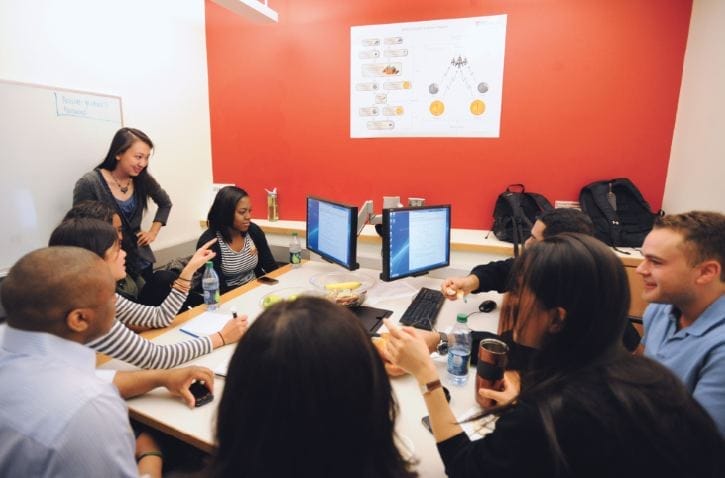Zachary Lyons, a Wharton senior who lives in the Bahamas, gave up five days at the beach to come back to campus in early January to take part in a new pilot course, the Wharton Senior Capstone simulation.
“It was worth it,” says Lyons, who is concentrating in marketing and management with a minor in Italian. “I think it was really an intense experience, which you don’t really expect coming in, but it was good to see how much of the knowledge you were able to use. It kind of showed how much we learned, how far we had come in four years at the School.”
The pilot was so successful that efforts are being made to add the course permanently to the curriculum in 2013.
The half-credit, pass-or-fail program (WH 398X) involved 52 seniors, divided into six teams: three manufacturing companies and three service providers. Over four days, the students formulated business strategies as they dealt with interteam and intrateam dynamics, various challenges and crises, and potential merger-and-acquisition negotiations. The simulation played out in four rounds, each round equaling one year.
To succeed, the students leveraged their finance, management, marketing, accounting, operations and leadership abilities in their attempts to increase their companies’ market share, profits and total shareholder value. They also considered social responsibility, all while experiencing the time pressures of a real-world-like setting.
Georgette Chapman Phillips, vice dean of the undergraduate division, says the simulation “touches on all of those crucial academic areas and puts them into experiential light. … It was real-time decision-making without disciplinary boundaries.”
Phillips, who also serves as Wharton’s David B. Ford Professor of Real Estate and a professor of legal studies and law, found the simulation at Wharton Executive Education.
“The [Capstone] hits on exactly the right skills that we hope for the undergraduates to hone in on,” she says, adding that Wharton’s Graduate Division also assisted with the Capstone.
“This [simulation] had never been done with an undergraduate population before. It had only been done with corporate executives, high-level executives,” says Hoi Ning Ngai, associate director of academic affairs and advising.
The simulation, says participant Bahja Johnson, a senior who is concentrating in marketing and legal studies, is a way for students to “get into the nitty-gritty of the program and not be worried about a grade.”
“For me, I would do it again in a heartbeat, and I would encourage everyone to do this,” she says, adding that the program also included fun social activities.
In addition to strategy and decision-making, students reflected on their teams’ dynamics and cooperation, according to Aviva Hirschfeld Legatt, associate director of the Undergraduate Leadership Program, who served as a project manager for the Capstone with Ngai.
The program also demonstrates the Undergraduate Division’s agility in developing new coursework. The Capstone came together quickly, Ngai explains. Initial discussions occurred during the summer of 2011, with plans ramping up over the fall and culminating in the simulation pilot, which took place from Jan. 7 to 10, 2012.

























